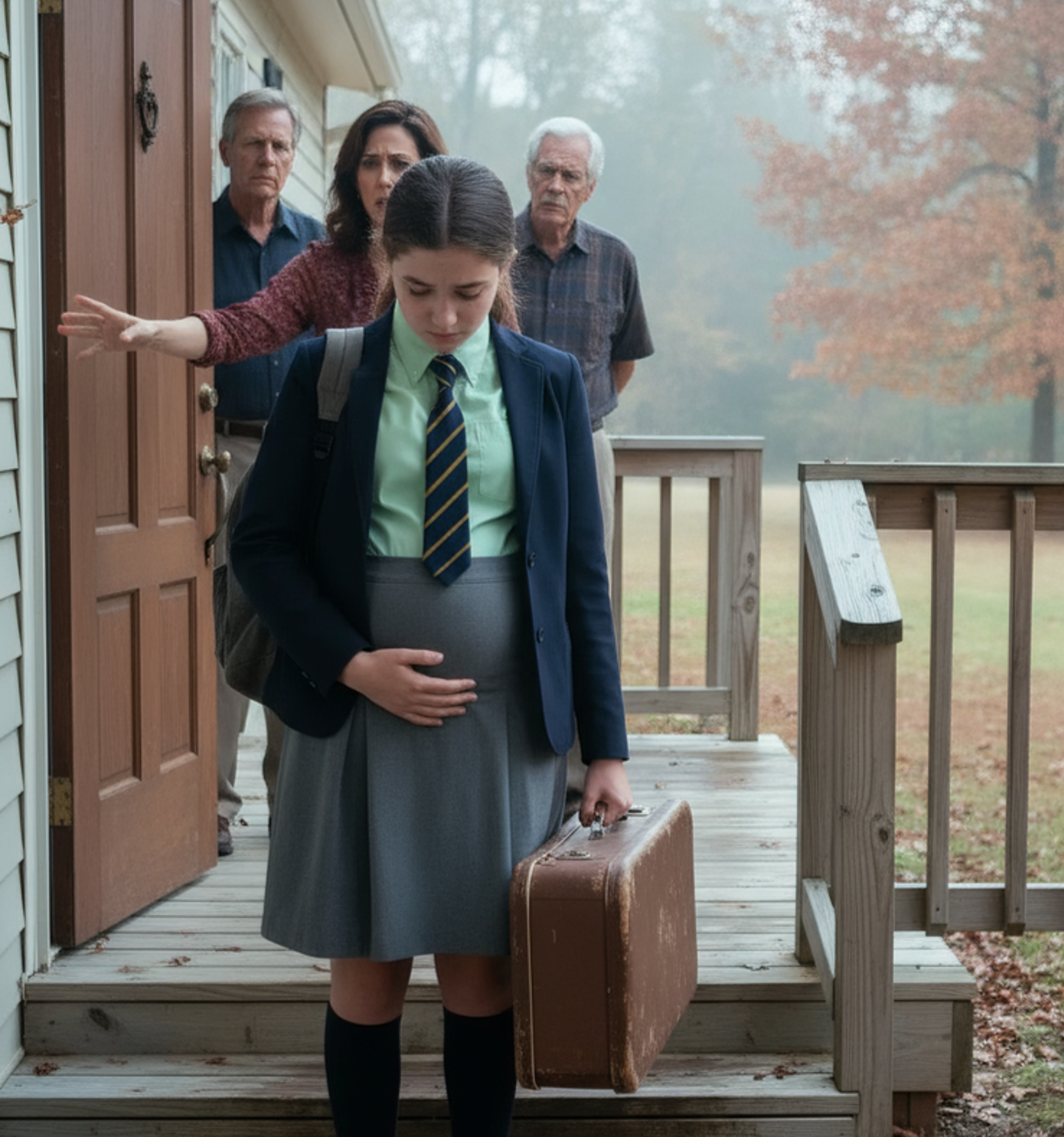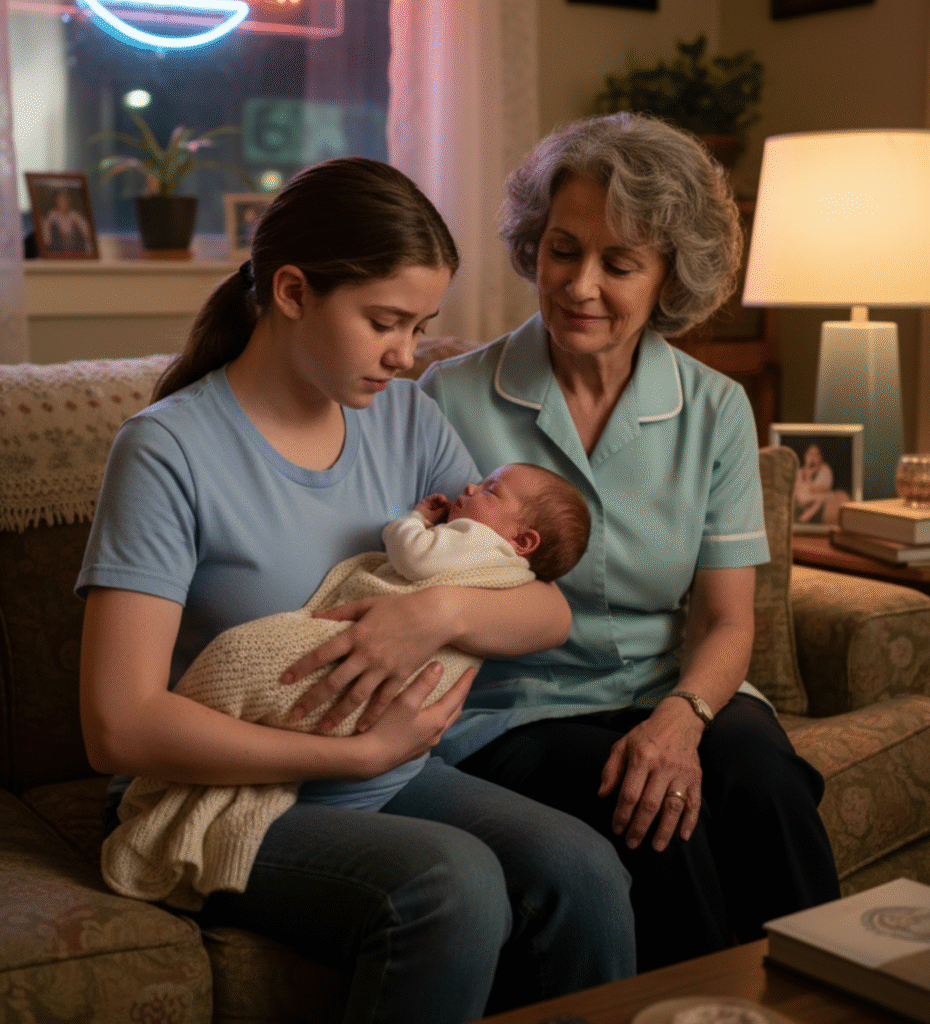
At fourteen, Anna Mitchell stood on the porch clutching a small suitcase, rain dampening her hair and cheeks. The early autumn wind in Willow Creek, Kentucky, carried the scent of wet leaves—and heartbreak.
From behind the closed door came her mother’s voice, sharp and shaking.
“You’ve disgraced this family, Anna. Don’t you dare come back.”
Anna didn’t plead. She just held her stomach—the fragile life growing inside her—and stepped off the porch into the cold night. Each porch light she passed seemed to whisper what she no longer had: warmth, home, belonging.
Hours later, she found herself trembling at a dimly lit gas station. That’s where Ruth, a middle-aged nurse heading home from a late shift, noticed her. Without hesitation, Ruth wrapped her coat around Anna’s shoulders and said quietly, “You look like you could use a warm meal and a place to rest.”
Ruth’s apartment above a laundromat became a sanctuary. It wasn’t much, but it was safe. There, Anna rebuilt herself piece by piece. She worked part-time, studied at night, and learned what strength felt like.
That spring, when her baby girl, Emma, was born, Anna whispered a promise through tears:
“You’ll never wonder if you’re loved.”
The years that followed were hard but full of purpose. By nineteen, Anna earned her GED. By twenty-three, she had become a nurse, inspired by the woman who once saved her. By twenty-eight, she had carved out a quiet, steady life in Nashville.
Still, sometimes when the house went still and Emma slept, Anna found herself wondering if her mother ever thought about her—or about the granddaughter she’d never met.
Then, one evening, the phone rang. The voice on the line made her heart stop.
“Anna,” her brother Jacob said softly. “You should come home. Mom’s sick.”
For a long moment, she said nothing. The home that had rejected her now needed her. She looked at Emma, now fourteen herself, her green eyes mirroring Anna’s own.
“I don’t know if I can face them,” Anna murmured.

But she knew she would.
The road to Willow Creek hadn’t changed—same leaning barns, same faded signs—but Anna had. She was no longer the terrified girl who had been sent away. She was a woman who had built her life from nothing.
Still, when she turned down Maple Hollow Road and saw the Mitchell farmhouse, her hands began to tremble.
“So this is where you grew up?” Emma asked quietly, staring out the window.
Anna nodded. “Yeah. It used to feel like the whole world.”
When she parked, Jacob stepped out to meet her. His hair was thinner now, his shoulders broader. “You came,” he said softly.
“You didn’t leave me much of a choice,” Anna replied with a faint smile.
Inside, the house smelled of pine and lavender—the same as she remembered. But it felt smaller, quieter, almost fragile. On the sofa sat her mother, Marie, wrapped in a blanket. Her once fiery red hair had turned silver, and her eyes looked tired but sharp.
“Hi, Mom,” Anna said softly.
Marie blinked in disbelief. “Anna?”
“It’s me.”
Her mother’s lips trembled. “You shouldn’t have come.”
The words stung, but Anna didn’t back away. “Jacob said you were sick.”
“I don’t need your pity,” Marie muttered.
“Mom,” Anna said gently, motioning to Emma. “This is your granddaughter.”
Marie’s gaze flicked to the girl. Her expression softened. “She’s… beautiful,” she whispered. “Just like you were.”
That night, they sat down to dinner, the air thick with silence. Jacob tried to keep the conversation light, but tension clung to the walls. When Emma went upstairs to bed, Marie finally spoke.
“I prayed for forgiveness,” she said quietly. “But I couldn’t forgive you. Not after what you did.”
Anna’s throat tightened. “I was fourteen. I didn’t do something to you. I was scared and alone.”
“You humiliated this family,” Marie said, her voice cracking. “Your father never recovered. He died believing you hated him.”
Anna swallowed hard. “I never hated him. I hated that you made me feel like I didn’t belong.”
Marie turned away, tears glistening in her eyes. “Maybe I deserve that.”
That night, as the house creaked in the dark, Anna lay awake listening to her mother cough down the hall. The anger she’d carried for years began to melt into something else—sorrow.
The next morning, sunlight streamed through the kitchen window as Anna drank her coffee. Emma shuffled in, sleepy-eyed. “Mom,” she said softly, “Grandma was crying last night.”
Anna exhaled. “Yeah. We’ve both been holding on to things we never said.”
“You always tell me people can change,” Emma whispered.
Anna smiled faintly. “I still believe that.”
Later that afternoon, Marie asked to see her alone. Sitting in the sunroom, wrapped in a shawl, she looked smaller than Anna remembered.
“The doctors say it’s heart failure,” she said quietly. “I didn’t want you to see me like this.”
Anna’s eyes welled. “You should’ve called me sooner.”
Marie stared at her hands. “The night you left… I thought I was doing the right thing—protecting our name. But every year since, I’ve wondered if I let pride steal my daughter.”
Anna’s voice broke. “You did. But I still came back.”
Marie reached for her hand. “Can you forgive me?”
Anna took her mother’s trembling fingers and squeezed them gently. “I already did. I just needed you to ask.”
For the first time in fourteen years, her mother smiled—a soft, trembling smile.
“Your girl,” she said, “she’s my second chance, isn’t she?”
“She is,” Anna whispered.
In the weeks that followed, Anna stayed. They cooked simple meals, shared stories, and stitched broken years together. Emma and Marie became inseparable, laughter echoing through rooms once filled with silence.
When winter came, Marie passed peacefully in her sleep, her hands folded around the Bible she’d once clung to for judgment, now for mercy.
At the funeral, Anna stood beside Emma, the wind brushing against their faces. Jacob placed a hand on her shoulder. “She was proud of you in the end,” he said quietly. “She just didn’t know how to say it.”
Anna nodded. “Neither did I. But I think she knew.”
As they walked away, Emma looked up. “Are we going home now?”
Anna smiled through her tears. “We already are.”
The house that had once rejected her no longer held power over her story. She had returned not to erase the past, but to forgive it—and in doing so, she found peace.
Because sometimes, going home isn’t about the place you left behind—it’s about the person you become when you finally return.


